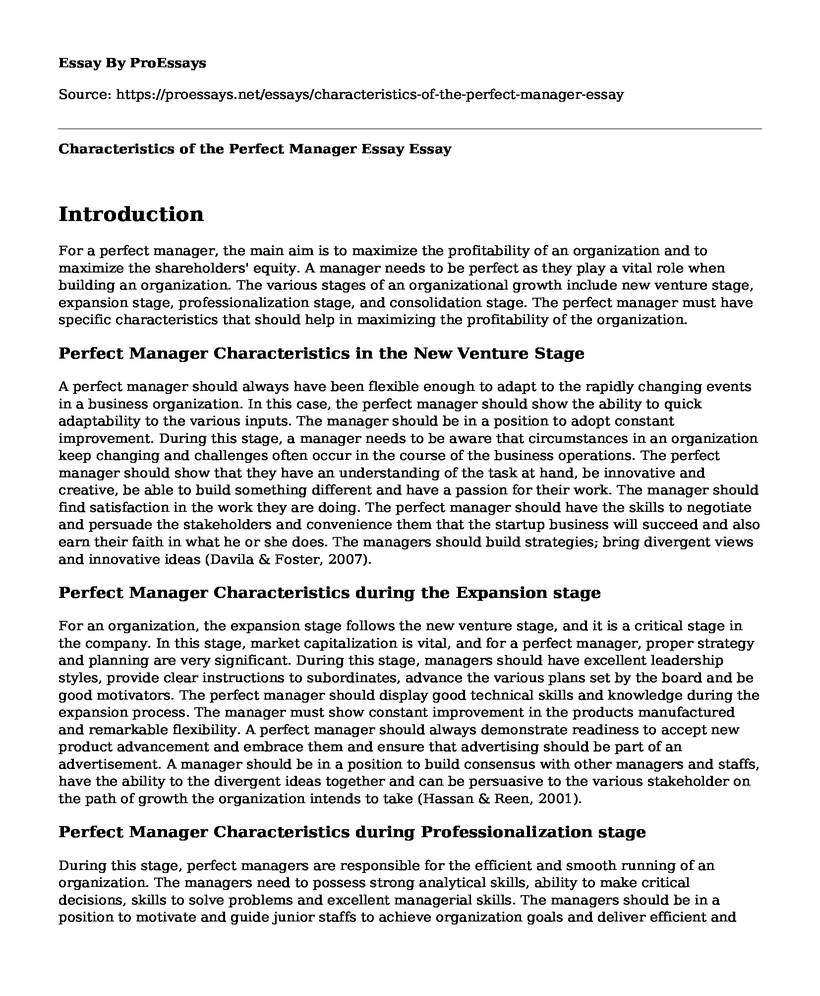Introduction
For a perfect manager, the main aim is to maximize the profitability of an organization and to maximize the shareholders' equity. A manager needs to be perfect as they play a vital role when building an organization. The various stages of an organizational growth include new venture stage, expansion stage, professionalization stage, and consolidation stage. The perfect manager must have specific characteristics that should help in maximizing the profitability of the organization.
Perfect Manager Characteristics in the New Venture Stage
A perfect manager should always have been flexible enough to adapt to the rapidly changing events in a business organization. In this case, the perfect manager should show the ability to quick adaptability to the various inputs. The manager should be in a position to adopt constant improvement. During this stage, a manager needs to be aware that circumstances in an organization keep changing and challenges often occur in the course of the business operations. The perfect manager should show that they have an understanding of the task at hand, be innovative and creative, be able to build something different and have a passion for their work. The manager should find satisfaction in the work they are doing. The perfect manager should have the skills to negotiate and persuade the stakeholders and convenience them that the startup business will succeed and also earn their faith in what he or she does. The managers should build strategies; bring divergent views and innovative ideas (Davila & Foster, 2007).
Perfect Manager Characteristics during the Expansion stage
For an organization, the expansion stage follows the new venture stage, and it is a critical stage in the company. In this stage, market capitalization is vital, and for a perfect manager, proper strategy and planning are very significant. During this stage, managers should have excellent leadership styles, provide clear instructions to subordinates, advance the various plans set by the board and be good motivators. The perfect manager should display good technical skills and knowledge during the expansion process. The manager must show constant improvement in the products manufactured and remarkable flexibility. A perfect manager should always demonstrate readiness to accept new product advancement and embrace them and ensure that advertising should be part of an advertisement. A manager should be in a position to build consensus with other managers and staffs, have the ability to the divergent ideas together and can be persuasive to the various stakeholder on the path of growth the organization intends to take (Hassan & Reen, 2001).
Perfect Manager Characteristics during Professionalization stage
During this stage, perfect managers are responsible for the efficient and smooth running of an organization. The managers need to possess strong analytical skills, ability to make critical decisions, skills to solve problems and excellent managerial skills. The managers should be in a position to motivate and guide junior staffs to achieve organization goals and deliver efficient and timely work in the required time. The managers should possess excellent interpersonal skills to help interact with the different organization and marketing entities. The managers need to possess self-motivation skills, show versatility, calmness, creativity and a good team player (Kazanjian & Drazin, 2010).
Perfect Manager Characteristics during Consolidation stage
During consolidation, two or more companies or industry components merge to form a new entity. In this stage, a manager needs to have excellent managerial skills to running this two different entities. The manager should know the working culture and environment of the separate entities. If the two organizations are situated in different countries, the manager needs to be aware of the various laws and regulations that exist in these countries. The perfect managers should have confidence in themselves when making decisions and be in a position to handle grievances that occur within the organization (Olson & Terpstra, 2012).
References
Davila, A., & Foster, G. (2007). Management Control Systems in EarlyStage Startup Companies. The Accounting Review, 82(4), 907-937. doi:10.2308/accr.2007.82.4.907
Hassan, J., & Reen, D. J. (2001). Human Recent Thymic Emigrants-Identification, Expansion, And Survival Characteristics. The Journal of Immunology, 167(4), 1970-1976. doi:10.4049/jimmunol.167.4.1970
Kazanjian, R. K., & Drazin, R. (2010). A stage-contingent model of design and growth for technology based new ventures. Journal of Business Venturing, 5(3), 137-150. doi:10.1016/0883-9026(90)90028-r
Olson, P. D., & Terpstra, D. E. (2012). Organizational Structural Changes: Lifecycle Stage Influences and Managers and Interventionists Challenges. Journal of Organizational Change Management, 5(4), 27-40. doi:10.1108/09534819210021447
Cite this page
Characteristics of the Perfect Manager Essay. (2022, May 26). Retrieved from https://proessays.net/essays/characteristics-of-the-perfect-manager-essay
If you are the original author of this essay and no longer wish to have it published on the ProEssays website, please click below to request its removal:
- Strategic Management Information System Exam
- Time Management Problems in School Paper Example
- Application for Full Prescriptive Authority
- Essay Example on Traversing to Work: The Complexity of My Commute
- Research Proposal on Strategic Planning, Innovation & Change: Keys to Business Success
- Positive Mindset for Self-Defense: Learn to Overcome Conflict - Research Paper
- Essay Example on Liquidation Damages: A Remedy for Breach of Contract







